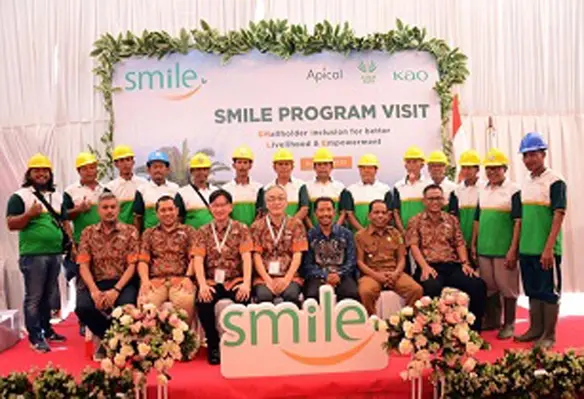Apical, Asian Agri and Kao collaborated and launched the Smallholder Inclusion for better Livelihood & Empowerment (SMILE) programme in 2020
Smallholders are essential to the industry as they contribute significantly to Indonesia’s total palm oil output. However, the smallholders face significant challenges in order to grow production of palm oil while upholding strict sustainability criteria. SMILE’s efforts to improve the livelihood of smallholders have been fruitful thus far.
Earlier in May marked the first time that Apical, Asian Agri and Kao have all travelled together to one of the Koperasi Unit Desa (KUD)s of the smallholders – KUD Anugerah, Riau. The event featured a productive dialogue session with smallholders from the KUD, who were introduced to the SMILE programme and informed of the significant roles performed by Apical, Asian Agri and Kao in the endeavour. The participants also enjoyed a guided tour of the smallholder plantation, school area, and residences of smallholders, which provided valuable insight into the efforts of the local community to promote sustainable agriculture practises.
The SMILE programme has made tremendous strides since its inception in October 2020, with 3,018 smallholders engaged and 390 smallholders certified by the RSPO. The programme plans to audit three new KUDs in 2023, with participation from approximately 1,105 smallholders in North Sumatra and Jambi. Activities that have been implemented and proven successful thus far will continue to be conducted throughout the programme, but not limited to:
1. Identification of gap-filled measures for RSPO certification requirement
2. Development and support of procedures required for RSPO certification
3. Capacity building and trainings for smallholder groups:
a. Improve yield productivity through sustainable GAP
b. Implement robust safety measures across their estates to farmers
c. Protect and conserve ecosystem and biodiversity including zero-burning practice
4. Implement FFB traceability and monitoring by conducting polygon mapping of smallholders’ plantations
5. Guarantee uptake of smallholders’ FFB at a premium.
The SMILE Programme is tailored to help independent smallholders overcome barriers by lowering the smallholders’ cost by at least 30% and increase yield through access to knowledge, training and resources. Sustainable palm oil produced by participating smallholders will be sold at a premium. By prioritising sustainable and inclusive practices through SMILE, the programme seeks to increase the smallholders’ income, consequently improving their livelihood and foster long-term sustainability.
According to Guntur Cahyo Prabowo, RSPO acting head of Smallholder Programme, it is important to make shared responsibility works in practice for solutions to be effective. “This is why RSPO has been working with our partners in both oil palm producing and consuming regions to keep collaborations as inclusive as possible, and with multi-stakeholder representation that considers all levels of the supply chain and the affected communities.
“We have stepped up our collaboration with local partners in producing regions to improve smallholder inclusion, so that they can join the sustainable palm oil supply chain and improve their livelihoods. Besides that, RSPO has developed an additional and separate standard, exclusively applicable to independent smallholders. Collective action must be taken to close the gap between the supply and demand of RSPO certified palm oil,” he said.




